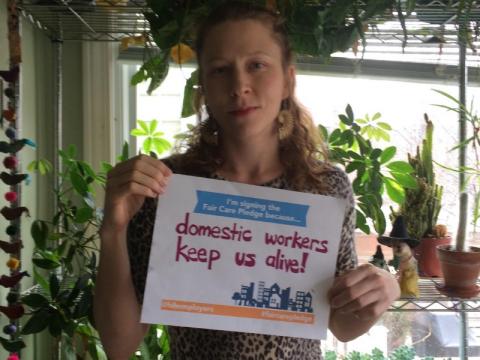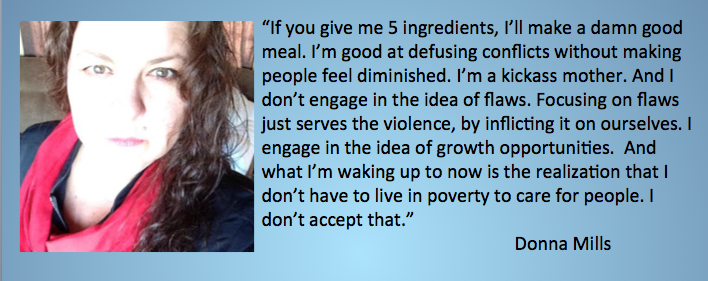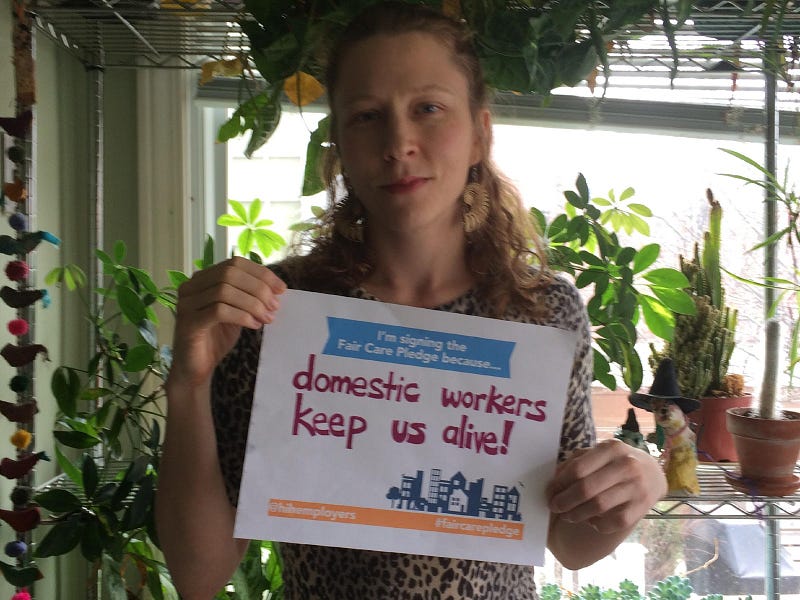
Who can defend us against growing epidemics of violence, hate, and war? Donald Trump and his allies are vowing to “keep America safe” by cutting $54 billion from domestic programs and pumping it into our military, which is already by far the largest military in the world. The media keeps on parading lawmakers, strategists, and various “experts” to tell us what our problems are and how we should solve them. But we will never be truly safe until we pay respect to the millions of expert peacemakers who are already all around us, quietly working to keep people alive.
Their works brings little drama, little scandal — and little thanks. Only in the past few years have they begun to win basic labor rights. And yet, domestic workers — housecleaners, nannies, home attendants, and people who care for family — are some of the most powerful forces for peace in this world.
They have always been the invisible fuel of our economy, doing the work at home that makes it possible for others to go out and do all other work. They keep us healthy and safe. They make countless decisions about how to care for and discipline people — decisions that add up to shape the course of human evolution. If we care about the survival of our species, we would be wise to minimize military and policing budgets, and shower resources on the legions of people who serve, protect, and defend life at home.

Domestic workers save lives
I have played many roles in the hidden world of domestic work. As a nanny, I fed, wiped, washed, played with and taught babies and toddlers, freeing their parents up to return to their careers and make more money than me. As a caregiver for elders and people with disabilities, I shaved men’s faces, gave baths to grown women, and massaged neglected muscles, infusing my hands with care for people who had no one else to touch them. I read foreign prayers aloud with them, slipping into shared reverence for their faith. I sat in silence with people who were afraid to die, my advice unwelcome, my brain useless, with nothing for to do but feel their sadness with them. How can we possibly measure the worth of all the emotional labor that domestic workers do?

Today, I care for caregivers. As a therapist for Early Intervention, I visit parents of toddlers with developmental differences, reminding them that they are far more powerful than they realize. Firefighters and surgeons are honored for saving lives; but caregivers are lifesavers too, keeping people connected to their reasons for living, one spoonful, wipe, smile, sigh, and tuck-in at a time.
In the days surrounding the March 8 Women’s Strike, I wondered how many millions of people can’t strike, or refuse to strike, because they hold lives in their hands. There are few jobs as essential to human survival as caregiving. If we were to withhold our labor, we wouldn’t just create inconveniences. People would die.
It’s the economy
So what can we do? We can push our private, often invisible work into the public. We can remind the world that the word economy comes from the Greek word oikos, for home — and the economy would collapse without us. I’ve embarked on a project with prosocial people — that is, anyone who acts with care for the greater good — to come together in Chicago and beyond, to connect our stories through conversations, interviews and poetry, and broadcast them through videos, memes, performances, and anything else we can dream.
The media loves to highlight humanity’s antisocial side: fear and violence, greed and competition. We need more media from the masses who are making peace and maximizing human potential every day. But many of us are absurdly humble. So as we demand to be seen and valued by the world, we need to practice seeing, and valuing, ourselves.

See the Prosocial Power website to receive updatesand add your voice to this growing project!
Despite great gains in recent years, many domestic workers are still not making a living wage. They need higher pay and benefits. But they’re not the only ones who reap the rewards of good treatment. My little girl deserves to be cared for by someone who slept in peace last night, someone who eats well, and never has to skimp on groceries to pay the rent. If I need to hire someone to help me care for my mother, that person should have vacations to look forward to, and enough energy and stability in their life that they have plenty left over to share with my mom. Our employee’s working conditions and our loved one’s living conditions are one and the same. Their dignity is our dignity.
Hand in Hand, the Domestic Employers Network, works to foster this awareness among people whose home is also somebody’s workplace. Their new Sanctuary Homes campaign aims to build solidarity with workers facing an administration that is openly hostile to immigrants, and their Fair Care Pledge helps families to calculate fair pay and time off, and communicate clear expectations. They partner with organizations like the National Domestic Workers Alliance, who bring workers together to build skills and solidarity, and insist on financial security.

I’m signing the Fair Care Pledge because domestic workers keep us alive! — Kate Duva
Investing in our security—and dignity
All domestic workers deserve to thrive — but many of us can’t afford to pay them as generously as we should. And those of us who devote hours to caring for our own family members often find that it causes us to take a financial hit. This is where society needs to come in.
America has by far the largest military in the world. More than half of our tax dollars go towards defense, and we’ll pour even more into growing the military and expanding police power, if the current administration has its way. Our federal taxes pay some $4 billion a year in subsidies to oil companies, $8 billion in extra funding to state and local prisons, and $20 billion to factory farms. This is our money — we must demand that more of it subsidizes caregivers, families, and social services by the people, for the people.
Our economy is built on sexism, bigotry, and exploitation. Economists from Adam Smith to Karl Marx have invisibilized domestic work, dismissing it as “reproductive labor,” not to be measured or compensated as “productive” labor is. Just as we expect cows to give us milk, we expect caring people to sustain life for little or nothing in return — after all, they’re not in it for the money! They do it out of the goodness of their hearts. Or because it’s family. Or because it’s the only way to survive.
Much of America’s wealth is built on unpaid domestic work and slave labor, and our New Deal era labor laws are steeped in racism that deliberately excluded domestic workers, who were, and still are, mostly women of color and immigrants. But now, Angela Davis, Riane Eisler, Silvia Federici, Marisa Morán Jahn, Ai-Jen Poo, and countless more are speaking up, compelling us to see the invisible, reminding us that we the people are experts too — and that we can, and must, envision better ways.

So next time you find yourself being bombarded by “experts” — the usual who’s who of lawmakers, authors, and so-called leaders telling you what we can and can’t afford to keep our world safe — ask yourself, Who cooks their food? Who cooks mine? Who mops all the floors we walk on? Who scrubs all the toilets we use? Who will spoon-feed our mothers and our fathers? Who will change our kids’ diapers? Who changed mine? Who kept me from running into traffic, and raised me to mean it when I say sorry, and who taught me what love is? Who do I depend on to stay alive? Am I listening to them? Do I have any idea what they’re capable of, and what they need?
Our best defenses against loneliness, hate, and violence are right here in our homes, schools, daycares and nursing facilities. Caregivers and domestic workers serve and protect. They defend and connect. They keep us working. They keep us alive. The survival of human dignity depends on our respecting them, and paying them, as the lifesavers they are.
Originally posted by Hand In Hand on Medium.com.



The views and opinions expressed in this post are those of the author(s) and do not necessarily reflect those of MomsRising.org.
MomsRising.org strongly encourages our readers to post comments in response to blog posts. We value diversity of opinions and perspectives. Our goals for this space are to be educational, thought-provoking, and respectful. So we actively moderate comments and we reserve the right to edit or remove comments that undermine these goals. Thanks!